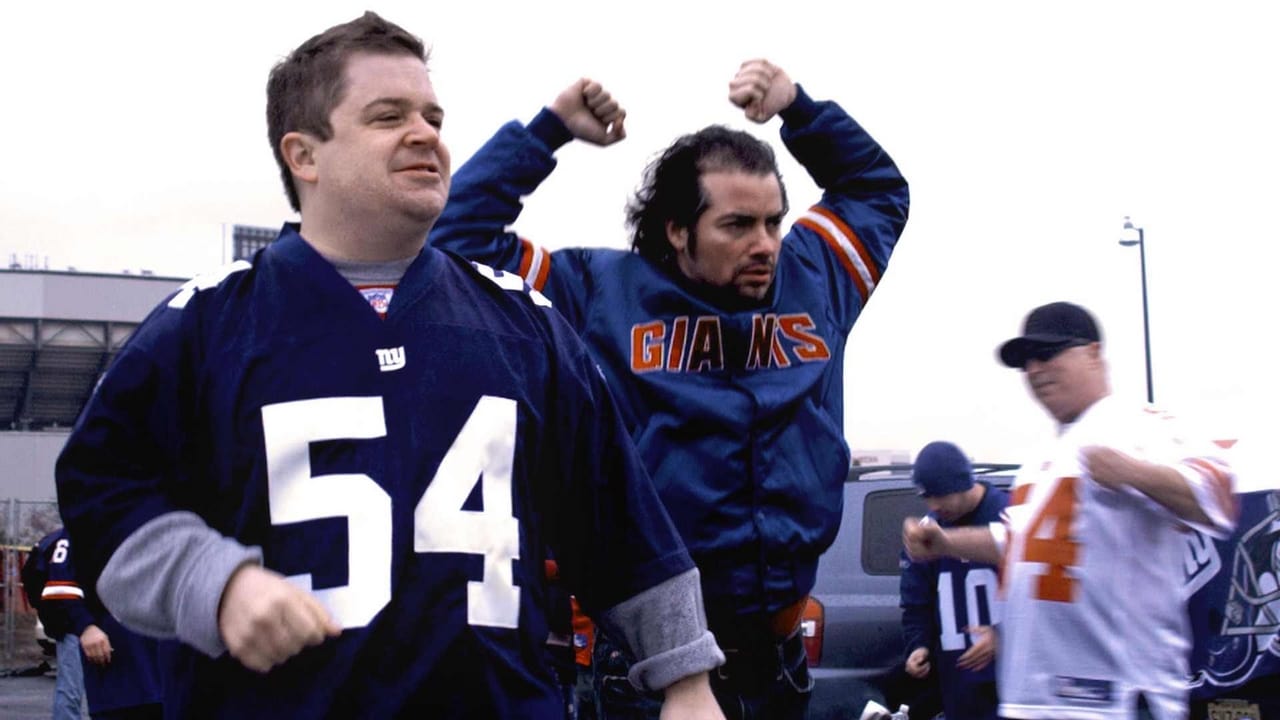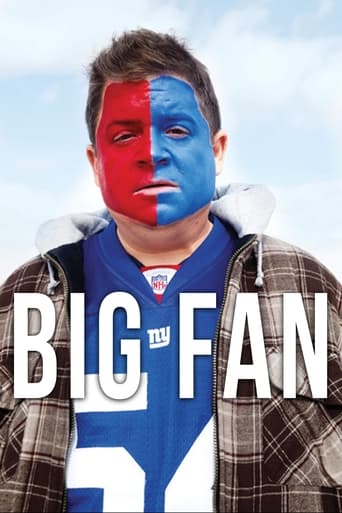Phonearl
Good start, but then it gets ruined
Matialth
Good concept, poorly executed.
Robert Joyner
The plot isn't so bad, but the pace of storytelling is too slow which makes people bored. Certain moments are so obvious and unnecessary for the main plot. I would've fast-forwarded those moments if it was an online streaming. The ending looks like implying a sequel, not sure if this movie will get one
Asad Almond
A clunky actioner with a handful of cool moments.
Dan Franzen (dfranzen70)
What a poetically sad movie! Patton Oswalt is just amazing and sincere as a sad-sack loser who happens to be a HUGE FAN of the New York Football Giants. So much so that he and his pal Sal watch the games on an old TV in the stadium parking lot - presumably for the ambiance - rather than at home.When the guys run into the team's star linebacker, they follow him surreptitiously - which leads to a cringe-worthy confrontation and, ultimately, Patton's Paul being beaten very badly. Now he's in an unenviable position: he can press charges, partly for the money and partly to teach these "thug athletes" (term from movie) a lesson, or he can let things go so that the Giants don't suffer as a team. This is a die-hard fan right here.His family thinks it's not a tough decision. His local-celebrity brother, a personal-injury lawyer, certainly wants Paul to sue. His mom wants him out of the house (yes, he lives with his mom). But Paul feels a strange, strong loyalty to the player and the team, despite his severe injuries.Oswalt is really amazing here. He's not funny. He's never funny. He's just the epitome of pathetic, and Oswalt's portrayal is as authentic as they come. There's so much to him as a character that the ending is an interesting surprise, too.There's no on-field football action, so if you're looking for sportsing, you're out of luck. This is a character study, and is an exquisitely detailed one. A fine, if somber, movie.
john32935
I count myself as a big fan of Big Fan. If you watch it, you may too.The story revolves around the title character's (Patton Oswalt in a very good star turn) rather depressing, boring life and his reasons for living, the NY Giants football team and his opportunity for notoriety via his "witty" banter on a sports radio call-in show. When he randomly spots, follows and approaches one of the team's stars, he unknowingly triggers a violent response. Rather than use this experience to change his view of his team, he denies any wrong-doing in an attempt to not cause HIS team any disruption on their march to the playoffs.This character study is detailed and very realistic, with some interesting twists. Each of the minor characters also ring true, and one could easily picture this story as a slice of life for any number of anonymous sports fans. There is enough comedy (light and dark) and emotional sincerity that this movie will appeal to more than the sports fan.
manicman84
Big Fan stands as a profound and thoroughly remarkable character study marked by a magnetic performance of Patton Oswalt. He excels as Paul Aufiero, a life-long fan of New York Giants being brutally hit by one of Giants' top players in a strip club. Oswalt is equally sympathetic and believable starring as this deeply troubled character. His performance is the chief, but thankfully not the only reason to see Big Fan. Writer-director Robert Siegel regards the sports fanaticism as an addiction and that gives his film the necessary gravitas: its power and its credibility. The script is devoid of clichés with many well-observed situations thrown in and several ingenious twists you won't see coming. As a result, you observe Paul falling into decay with great anxiety combined with care. Siegel crafts a subversive comedy, funny and bleak in equal measures. It also works as a peculiar take on the pathology of sports mania.
Turfseer
Robert Siegel, the talented new screenwriter responsible for the indie hit, 'The Wrestler', now has written and directed his own feature on a limited budget. 'Big Fan' chronicles the misadventures of Staten Island resident Paul Aufiero, a fanatical New York (football) Giants fan who's in his mid-thirties and still lives at home with his mother. Paul works at a dead-end job as a parking attendant but has no interest in finding a new career. Instead, he pals around with Sal, his best friend, who is equally fanatical about the Giants. The obsessed couple reminds me of the hapless Garth and Wayne from Wayne's World in that they seem to revel in their social awkwardness.The fun of 'Big Fan is to see just how far Paul will go in his obsession with his beloved Giants. A good part of the obsession revolves around Paul's late night calls to a New York sports talk radio station. He's earned a reputation as the special caller from Staten Island, mainly known for his aggressive put-downs of the Philadelphia Eagle football team as well as their fans (Paul has a particularly noxious rivalry with his counterpart in Philadelphia, who also makes numerous late night calls to the station). In his provincial world, Paul fancies himself the king of all Giant fans but doesn't have the self-confidence to speak spontaneously when he calls into the radio talk show (instead he writes down what he wants to say on a pad of paper and reads it over the air, only to have his canned speech interrupted by his mother who ends up castigating him over the phone while the radio audience can hear everything she says).Due to their low paying jobs, Paul and Sal can't afford to buy a ticket and go inside the stadium to watch the Giants. Instead, they dutifully camp themselves out in the Giant parking lot and watch the game on a mini-TV set every week (Siegel was unable to gain permission from the NFL to film inside the stadium, so he created the above 'parking lot' scenario).We break into the Act Two of 'Big Fan' when Paul and Sal spot one of their favorite Giant players, Quantrell Bishop, hanging out with some friends in the Stapleton section of Staten Island. Paul and Sal drive into the City following Bishop and his entourage in their limousine and they all end up at an x-rated club in Manhattan. Paul attempts to strike up a conversation with Bishop and possibly get a picture taken with him. Things go horribly wrong, when a drunken Bishop believes that Paul is some kind of stalker and ends up pummeling him to the point where Paul ends up in a coma for three days. Bishop is immediately suspended by the NFL and his fate is up in the air.When Paul awakes from his coma in the hospital, his brother, a negligence attorney, wants to sue Bishop for $70 million. Naturally, Paul, the die-hard fan, will have nothing to due with the lawsuit much to the chagrin of his brother. Later, an NYPD detective pays numerous calls to Paul and finds that he's a totally uncooperative witness. Had this happened in real-life, Paul's identity would probably have been revealed in about a day's time and he would have been subject to intense media scrutiny. This is one of the major weaknesses in the plot. Instead, Paul's brother institutes the lawsuit without his permission and only after his brother takes action, does the media get wind that it's Paul who was involved in the incident at the strip club.There are moments of inspired lunacy in Big Fan. I particularly liked the take-off on the infomercial created by Paul's brother. The nagging of Paul by family members is not far removed from reality and the hoarding of the soy sauce by Paul's mother is a classic commentary on the root of Paul's dysfunction. Kudos also to the 'Sportsdog', the manic talk show announcer who I'm told has a sports talk show in real life on Sirius FM radio. More could have been done with Paul's sidekick, Sal, who ends up as a glorified cheerleader and what about Bishop? He simply disappears after the incident at the club.Big Fan becomes darker and less comic at the climax. After Paul's identity has been exposed and he's labeled a turncoat on talk radio, he feels he has to prove his 'loyalty' to the Giants so he puts on some 'warpaint' and drives to Philadelphia where he confronts the despised 'Philadelphia Phil' in a bar bathroom. At first it appears that Paul shoots Phil with a real gun which would have destroyed the entire comic tone of the movie; but as it turns out, the gun is merely a paint ball pistol and he ends up showering Phil with paint. Still, the scene underscores Paul's abject pettiness as he must resort to humiliating his rival by pretending that he's about to shoot him. The scene unfortunately makes Phil a much less likable and much more pathetic character as he resorts to violence to deal with his 'humiliation'. And one wonders if a character such as Paul would have done such a thing in the first place. After all, his goal is to prove to as many people as possible that he did not betray his team but his humiliation of Philadelphia Phil happens in a vacuum—no one else will ever get wind of what he did nor would anyone be impressed by his actions.Big Fan would have been more successful if we come to like Paul at the end despite his obsession. Instead, the lovable loser morphs into someone who's mean-spirited. Siegel however is to be commended for satirizing the fanatics of our society who delude themselves into believing that what they have to offer is meaningful, when in reality their obsessions are reflective of a profound shallowness.

